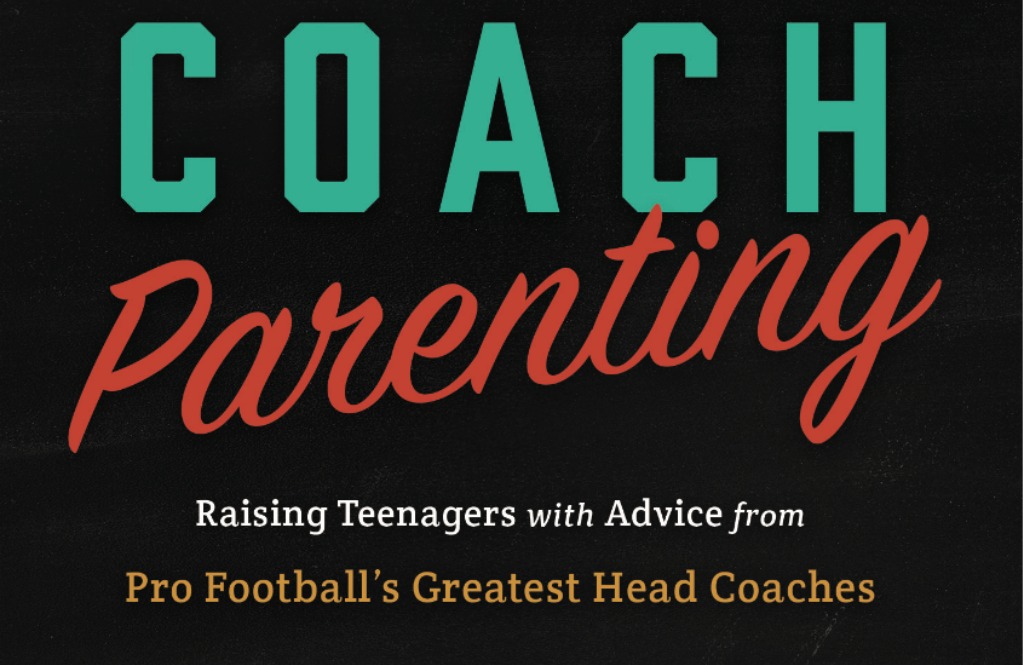
How To Parent Like an NFL Coach
(By Guest contributor Erika Katz)
My son had just turned fourteen and I asked him to pick up his shoes from the den no less than three times only to be ignored until I threatened to throw out his beloved high-tops. The next day at his varsity game, his coach asked him to pick up balls, cones, and even some of the other players’ shoes. He had them in his hand in three seconds! What was the coach doing that I was not? I wanted to know! So, I interviewed some of the NFL’s greatest head coaches and what they told me changed my parenting forever!
What’s Your Coaching Style?
When I started trying to parent like a coach, I worried I would have to transform myself into some sort of drill sergeant which is not my style at all. But, Former Dallas Cowboys Head Coach Jimmy Johnson said to me,
“I think the style that works best depends on your personality. Some people coach with fear and others are players’ coaches, but no matter what your style, all coaches have to demand the respect of the players.”
I developed a quiz to help you better understand your coaching style. Once you get your results, try some of these helpful tips from some of the NFL’s greatest head coaches to fine tune your coaching skills and turn your family into a winning team!
Quiz – https://www.erikakatz.com/quiz-what-kind-of-coach-are-you
Command Their Respect One way coaches command the respect of their team is by making their players earn playing time. If a player does not do what is asked, does not give their best effort, or is late for practice, they just won’t play. When I spoke with Baltimore Ravens Head Coach John Harbaugh, he told me,
“Everybody wants a bigger role; they want to be able to do more. The expanding of your role is earned. If we are given a bag of money to invest, if we do well with it, we are given more of it. If we don’t, we get less of it. With kids, the better you do with what you have, the more responsibility you get. In football, if you play well, then you get more playing time, you get the ball in your hands more. Too many turnovers—you are not going to play. You are handling the ball well, you are playing hard, you are playing well, you earn a bigger role.”
As a parent, you may not have the leverage of playing time but you do control how much freedom they have to do what they want. Like Coach Harbaugh, give your teens independence as they earn it. If your daughter takes the car without asking, she loses her car privileges. If she is always respectful and fills it with gas when she uses it, she has earned more car time. If your son is late for curfew, (even if there was traffic), he has to be home earlier the following week. When your kids show respect for you and your rules, they get what means most to them.
- Communication The greatest head coaches know how to communicate with their players. They seek every opportunity they can find to talk with them and establish trust. Former Chicago Bear Head Coach Dave Wannstedt described to me how he would open communication with his players.
“I used to try to create situations when we would travel where we would have team meals together. I always tried to put our players in an environment that cultivated conditions for them to be together. I tried to create an atmosphere where they could bond. As a parent, as well as a coach, you have to create situations where you can initiate communication.”
Good communication starts with taking a time-out from your busy life and sitting down to a family meal. While family mealtime can be difficult due to conflicting work schedules and extracurricular activities for the kids, if you can start with just one meal a week together, you will see an improvement in your family life and communication. With all the distractions in our lives, it’s easy to neglect this fundamental part of family time. There are even studies linking family mealtime to a host of positive outcomes, as this excerpt from an article by Anne Fishel in The Washington Post indicates:
Studies link regular family dinners with lowering a host of high-risk teenage behaviors parents fear: smoking, binge drinking, marijuana use, violence, school problems, eating disorders and sexual activity. In one study of more than 5,000 Minnesota teens, researchers concluded that regular family dinners were associated with lower rates of depression and suicidal thoughts. In a very recent study, kids who had been victims of cyberbullying bounced back more readily if they had regular family dinners.
- Half Time Adjustments Coaches must give their players constructive criticism to help them get better. As parents, we have to correct our kids when they do something wrong which is not always easy. Most kids don’t like being directly confronted about something they have done or may do. But it’s human nature to enjoy talking about what other people are doing or may do. So, why not capitalize on that? If your teenager can learn something without having to make the mistake themselves, think how valuable this could be.
Brian Billick, former head coach of the Baltimore Ravens and current NFL Network analyst, liked to use other teams as examples of what not to do.
“When you get an example from another team and you can teach a lesson from their mistake, that’s a great way to teach. Like when some player was being selfish, I would show it to my team and say, ‘What is this guy trying to accomplish and is he doing it?’
At home, bring up articles in the news, mistakes their friends have made, or even the tweet that got their favorite celebrity in trouble. Ask them what they would do if they were in that situation and what the person in question should have done. This is a great way to teach them what they should and should not do in a given situation.
- Lead by Example “Do what I say, not as I do” does not work for coaching or parenting. Your children will not buy in to your beliefs and values if you do not practice what you preach. Steve Mariucci, former head coach of the San Francisco 49ers explained how players often take their lead from their coaches.
“To some extent, the players take on the personality of their coach. If a coach shows poise and humility when things are great, looks unflappable when things are unraveling, and he’s remaining confident and doesn’t doubt himself, players observe that and imitate that. If I would say to the guys after a win, ‘We won a heck of a game and that was a really good team,’ and give them a lot of credit, often the next day, I would read that quote from the players, so I knew they were listening. If we lost, I would say, ‘Don’t blame the official for that call; it’s not about the one play.’ Hopefully they will follow suit and think, the coach said this, I should say this too. If I were to storm off the field like a poor sport, my guys would think that’s okay and might storm off the field too.”
Your kids are watching you and they look to you to show them what is okay and what is not. If you want your children to listen to you, then you need to always be a role model to them and lead by example.












